人教版(2019)选择性必修 第三册Unit 3 Environmental Protection Discover Useful Structures 课件(共19张PPT)
文档属性
| 名称 | 人教版(2019)选择性必修 第三册Unit 3 Environmental Protection Discover Useful Structures 课件(共19张PPT) | 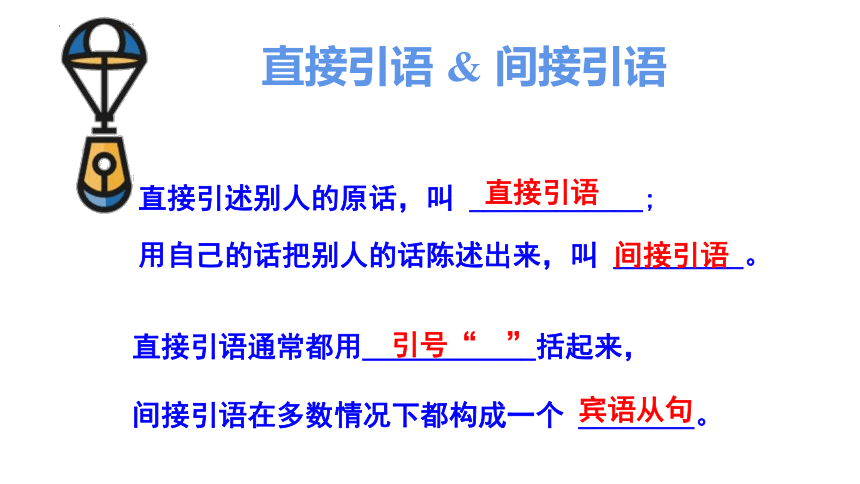 | |
| 格式 | pptx | ||
| 文件大小 | 407.3KB | ||
| 资源类型 | 教案 | ||
| 版本资源 | 人教版(2019) | ||
| 科目 | 英语 | ||
| 更新时间 | 2024-03-02 10:42:33 | ||
图片预览

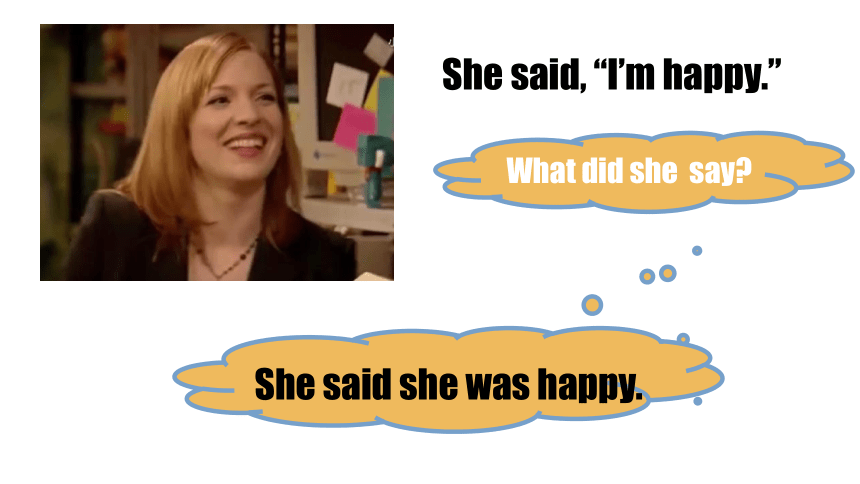
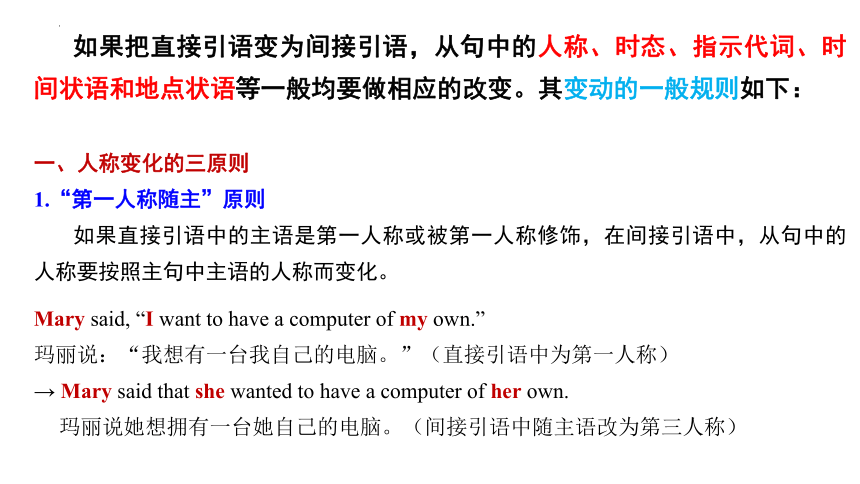
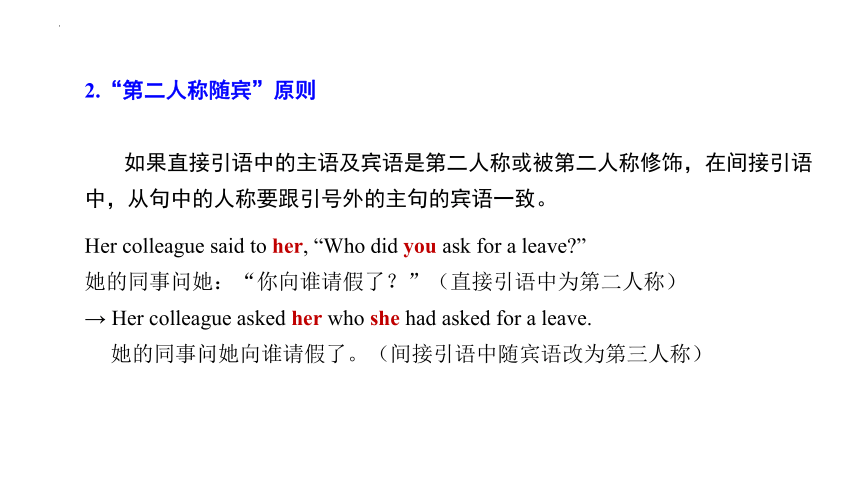
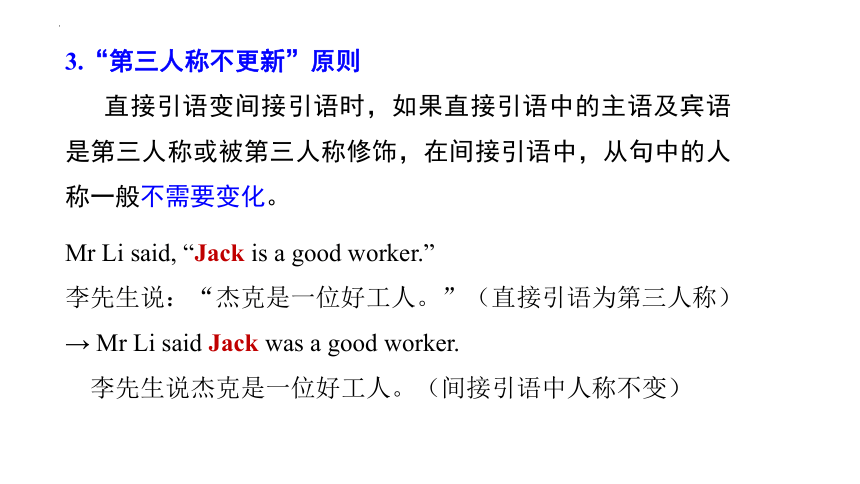
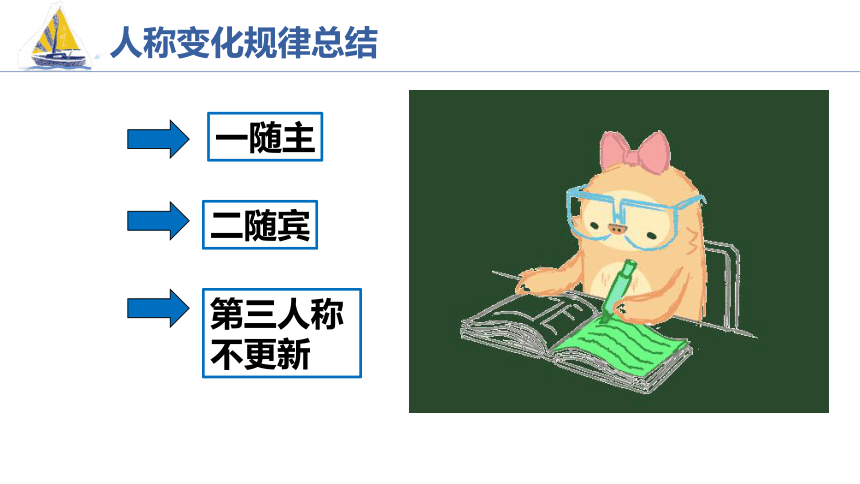
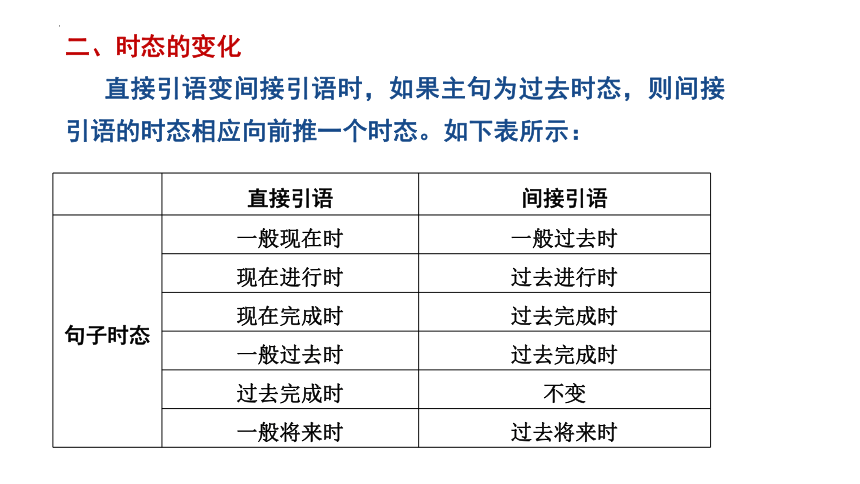
文档简介
(共19张PPT)
直接引述别人的原话,叫 ____________;
直接引语
用自己的话把别人的话陈述出来,叫 _________。
间接引语
直接引语通常都用____________括起来,
引号“ ”
间接引语在多数情况下都构成一个 ________。
宾语从句
直接引语 & 间接引语
She said, “I’m happy.”
She said she was happy.
What did she say
如果把直接引语变为间接引语,从句中的人称、时态、指示代词、时间状语和地点状语等一般均要做相应的改变。其变动的一般规则如下:
一、人称变化的三原则
1.“第一人称随主”原则
如果直接引语中的主语是第一人称或被第一人称修饰,在间接引语中,从句中的人称要按照主句中主语的人称而变化。
Mary said, “I want to have a computer of my own.”
玛丽说:“我想有一台我自己的电脑。”(直接引语中为第一人称)
→ Mary said that she wanted to have a computer of her own.
玛丽说她想拥有一台她自己的电脑。(间接引语中随主语改为第三人称)
2.“第二人称随宾”原则
如果直接引语中的主语及宾语是第二人称或被第二人称修饰,在间接引语中,从句中的人称要跟引号外的主句的宾语一致。
Her colleague said to her, “Who did you ask for a leave ”
她的同事问她:“你向谁请假了?”(直接引语中为第二人称)
→ Her colleague asked her who she had asked for a leave.
她的同事问她向谁请假了。(间接引语中随宾语改为第三人称)
3.“第三人称不更新”原则
直接引语变间接引语时,如果直接引语中的主语及宾语是第三人称或被第三人称修饰,在间接引语中,从句中的人称一般不需要变化。
Mr Li said, “Jack is a good worker.”
李先生说:“杰克是一位好工人。”(直接引语为第三人称)
→ Mr Li said Jack was a good worker.
李先生说杰克是一位好工人。(间接引语中人称不变)
人称变化规律总结
一随主
二随宾
第三人称不更新
二、时态的变化
直接引语变间接引语时,如果主句为过去时态,则间接引语的时态相应向前推一个时态。如下表所示:
直接引语 间接引语
句子时态 一般现在时 一般过去时
现在进行时 过去进行时
现在完成时 过去完成时
一般过去时 过去完成时
过去完成时 不变
一般将来时 过去将来时
His friend said to him, “We are planning to have a picnic.”
他的朋友对他说:“我们计划去野餐。”(直接引语为现在进行时)
→ His friend told him that they were planning to have a picnic.
他的朋友告诉他说,他们计划去野餐。(间接引语为过去进行时)
The organizer said, “We have begun our plan.”
组织者说:“我们已开始了我们的计划。”(直接引语为现在完成时)
→ The organizer said that they had begun their plan.
组织者说,他们已开始了他们的计划。(间接引语为过去完成时)
【注意】
当直接引语是客观真理、谚语或格言的情况下,直接引语变间接引语时,时态无变化。
My teacher said to us yesterday, “Early birds catch worms.”
昨天老师对我们说:“早起的鸟儿有虫吃。”(直接引语是谚语)
→ My teacher told us yesterday that early birds catch worms.
昨天老师告诉我们早起的鸟儿有虫吃。(变成间接引语时态不变)
三、指示代词、时间状语、地点状语及方向性动词的变化
引语 用词 直接引语 间接引语
指示代词 this 这个 that 那个
these 这些 those 那些
时间状语 now 现在 then 那时
today 今天 that day 那天
this morning 今天上午 that morning 那天上午
tonight 今天晚上 that night 那天晚上
tomorrow 明天 the next/following day 第二天
时间状语 yesterday 昨天 the day before 前一天
last night 昨天晚上 the night before 前一天晚上
the day before yesterday 前天 two days before 两天前
three days ago 三天前 three days before 三天前
next week 下一周 the next/following week 第二周
ago (至今)以前 before (那时)以前
地点状语 here 这儿 there 那儿
方向性动词 bring 带来 take 带走
come 来 go 去
She asked, “Is this book his ”
她问:“这本书是他的吗?”(直接引语中用this)
→ She asked whether that book was his.
她问那本书是不是他的。(间接引语中改为that)
四、连接词的选择
1. 直接引语是陈述句,变为间接引语时,常变成由that引导的宾语从句。在口语中,that可以省略。
He said, “I am very happy to help you.”
→ He said (that) he was very happy to help me.
2. 直接引语是一般疑问句、选择疑问句或反意疑问句时,间接引语中用whether (...or...或...or not) 或if引导。
He said, “Are you interested in English ”
→ He asked (me) if/whether I was interested in English.
【注意】如果主句中谓语动词是said,则将其改为asked。
3. 直接引语为特殊疑问句时,间接引语仍用原句中的特殊疑问词来引导,其余的变化遵照直接引语和间接引语之间的转换规则来进行。
“What’s your name ” he asked me.
→ He asked me what my name was.
【注意】
疑问句的直接引语变间接引语时,要把疑问语序变成陈述语序。
五、直接引语为祈使句时的变化
直接引语为祈使句变间接引语时,要根据说话人的情感和语气使用ask、invite、advise、warn、tell、order等词,再把祈使句的动词原形变为带to的不定式。如果祈使句为否定式,在不定式前加not。
He said to me, “Don’t be late tomorrow.”
→ He told me not to be late the next day.
The official said, “Get ready before lunch.”
→ The official ordered us to get ready before lunch.
1.“I will come and see you again this evening.” she said to Tom.
→ She told Tom that would go and see ______again that evening.
2.He said to me,“You are wrong.”
→ He told me that was wrong.
she
I
him
Consolidation
3."I bought the house 10 years ago, "he said.
He said that he ______bought the house 10 years________.
4. He said to me, "Did you see her last week
He__________________I had seen her the week ________.
5. He said, "You can sit here. Jim. "
He ________Jim that he _______sit there.
6. He asked, “How did you find it, mother ”
He asked his mother ___________ found it.
had
before
asked me if/whether
before
said to
could
how she had
7." Where have you been these days "he asked
He asked me ___________ been ________ days.
8. He said to me, "Do you know where she lives "
He asked_____________ knew where she_________.
9."Stop making so much noise, children, "he said.
He_________ the children ________ making so much noise.
10."Don' t tell him the news. "she said.
She told me ____________ him the news.
11. He said to me, "Are you interested in this "
He__________________ I was interested in__________.
where I had
those
me if/whether I
lived
told/asked
to stop
not to tell
asked me if/whether
that
12.She asked me, "Is this book yours or his ”
______________________________________________
13.The teacher asked,“How did you repair it ”
______________________________________________
14.The teacher said to the students, "Don' t waste your time.”
______________________________________________
15.The mother said, "Tom, get up early, please.”
______________________________________________
16.The teacher said, “The earth goes around the sun.”
______________________________________________
She asked me if/whether that book was mine or his.
The teacher asked me how I had repaired it.
The teacher told the students not to waste their time.
The mother asked Tom to get up early.
The teacher said that the earth goes around the sun.
直接引述别人的原话,叫 ____________;
直接引语
用自己的话把别人的话陈述出来,叫 _________。
间接引语
直接引语通常都用____________括起来,
引号“ ”
间接引语在多数情况下都构成一个 ________。
宾语从句
直接引语 & 间接引语
She said, “I’m happy.”
She said she was happy.
What did she say
如果把直接引语变为间接引语,从句中的人称、时态、指示代词、时间状语和地点状语等一般均要做相应的改变。其变动的一般规则如下:
一、人称变化的三原则
1.“第一人称随主”原则
如果直接引语中的主语是第一人称或被第一人称修饰,在间接引语中,从句中的人称要按照主句中主语的人称而变化。
Mary said, “I want to have a computer of my own.”
玛丽说:“我想有一台我自己的电脑。”(直接引语中为第一人称)
→ Mary said that she wanted to have a computer of her own.
玛丽说她想拥有一台她自己的电脑。(间接引语中随主语改为第三人称)
2.“第二人称随宾”原则
如果直接引语中的主语及宾语是第二人称或被第二人称修饰,在间接引语中,从句中的人称要跟引号外的主句的宾语一致。
Her colleague said to her, “Who did you ask for a leave ”
她的同事问她:“你向谁请假了?”(直接引语中为第二人称)
→ Her colleague asked her who she had asked for a leave.
她的同事问她向谁请假了。(间接引语中随宾语改为第三人称)
3.“第三人称不更新”原则
直接引语变间接引语时,如果直接引语中的主语及宾语是第三人称或被第三人称修饰,在间接引语中,从句中的人称一般不需要变化。
Mr Li said, “Jack is a good worker.”
李先生说:“杰克是一位好工人。”(直接引语为第三人称)
→ Mr Li said Jack was a good worker.
李先生说杰克是一位好工人。(间接引语中人称不变)
人称变化规律总结
一随主
二随宾
第三人称不更新
二、时态的变化
直接引语变间接引语时,如果主句为过去时态,则间接引语的时态相应向前推一个时态。如下表所示:
直接引语 间接引语
句子时态 一般现在时 一般过去时
现在进行时 过去进行时
现在完成时 过去完成时
一般过去时 过去完成时
过去完成时 不变
一般将来时 过去将来时
His friend said to him, “We are planning to have a picnic.”
他的朋友对他说:“我们计划去野餐。”(直接引语为现在进行时)
→ His friend told him that they were planning to have a picnic.
他的朋友告诉他说,他们计划去野餐。(间接引语为过去进行时)
The organizer said, “We have begun our plan.”
组织者说:“我们已开始了我们的计划。”(直接引语为现在完成时)
→ The organizer said that they had begun their plan.
组织者说,他们已开始了他们的计划。(间接引语为过去完成时)
【注意】
当直接引语是客观真理、谚语或格言的情况下,直接引语变间接引语时,时态无变化。
My teacher said to us yesterday, “Early birds catch worms.”
昨天老师对我们说:“早起的鸟儿有虫吃。”(直接引语是谚语)
→ My teacher told us yesterday that early birds catch worms.
昨天老师告诉我们早起的鸟儿有虫吃。(变成间接引语时态不变)
三、指示代词、时间状语、地点状语及方向性动词的变化
引语 用词 直接引语 间接引语
指示代词 this 这个 that 那个
these 这些 those 那些
时间状语 now 现在 then 那时
today 今天 that day 那天
this morning 今天上午 that morning 那天上午
tonight 今天晚上 that night 那天晚上
tomorrow 明天 the next/following day 第二天
时间状语 yesterday 昨天 the day before 前一天
last night 昨天晚上 the night before 前一天晚上
the day before yesterday 前天 two days before 两天前
three days ago 三天前 three days before 三天前
next week 下一周 the next/following week 第二周
ago (至今)以前 before (那时)以前
地点状语 here 这儿 there 那儿
方向性动词 bring 带来 take 带走
come 来 go 去
She asked, “Is this book his ”
她问:“这本书是他的吗?”(直接引语中用this)
→ She asked whether that book was his.
她问那本书是不是他的。(间接引语中改为that)
四、连接词的选择
1. 直接引语是陈述句,变为间接引语时,常变成由that引导的宾语从句。在口语中,that可以省略。
He said, “I am very happy to help you.”
→ He said (that) he was very happy to help me.
2. 直接引语是一般疑问句、选择疑问句或反意疑问句时,间接引语中用whether (...or...或...or not) 或if引导。
He said, “Are you interested in English ”
→ He asked (me) if/whether I was interested in English.
【注意】如果主句中谓语动词是said,则将其改为asked。
3. 直接引语为特殊疑问句时,间接引语仍用原句中的特殊疑问词来引导,其余的变化遵照直接引语和间接引语之间的转换规则来进行。
“What’s your name ” he asked me.
→ He asked me what my name was.
【注意】
疑问句的直接引语变间接引语时,要把疑问语序变成陈述语序。
五、直接引语为祈使句时的变化
直接引语为祈使句变间接引语时,要根据说话人的情感和语气使用ask、invite、advise、warn、tell、order等词,再把祈使句的动词原形变为带to的不定式。如果祈使句为否定式,在不定式前加not。
He said to me, “Don’t be late tomorrow.”
→ He told me not to be late the next day.
The official said, “Get ready before lunch.”
→ The official ordered us to get ready before lunch.
1.“I will come and see you again this evening.” she said to Tom.
→ She told Tom that would go and see ______again that evening.
2.He said to me,“You are wrong.”
→ He told me that was wrong.
she
I
him
Consolidation
3."I bought the house 10 years ago, "he said.
He said that he ______bought the house 10 years________.
4. He said to me, "Did you see her last week
He__________________I had seen her the week ________.
5. He said, "You can sit here. Jim. "
He ________Jim that he _______sit there.
6. He asked, “How did you find it, mother ”
He asked his mother ___________ found it.
had
before
asked me if/whether
before
said to
could
how she had
7." Where have you been these days "he asked
He asked me ___________ been ________ days.
8. He said to me, "Do you know where she lives "
He asked_____________ knew where she_________.
9."Stop making so much noise, children, "he said.
He_________ the children ________ making so much noise.
10."Don' t tell him the news. "she said.
She told me ____________ him the news.
11. He said to me, "Are you interested in this "
He__________________ I was interested in__________.
where I had
those
me if/whether I
lived
told/asked
to stop
not to tell
asked me if/whether
that
12.She asked me, "Is this book yours or his ”
______________________________________________
13.The teacher asked,“How did you repair it ”
______________________________________________
14.The teacher said to the students, "Don' t waste your time.”
______________________________________________
15.The mother said, "Tom, get up early, please.”
______________________________________________
16.The teacher said, “The earth goes around the sun.”
______________________________________________
She asked me if/whether that book was mine or his.
The teacher asked me how I had repaired it.
The teacher told the students not to waste their time.
The mother asked Tom to get up early.
The teacher said that the earth goes around the sun.
